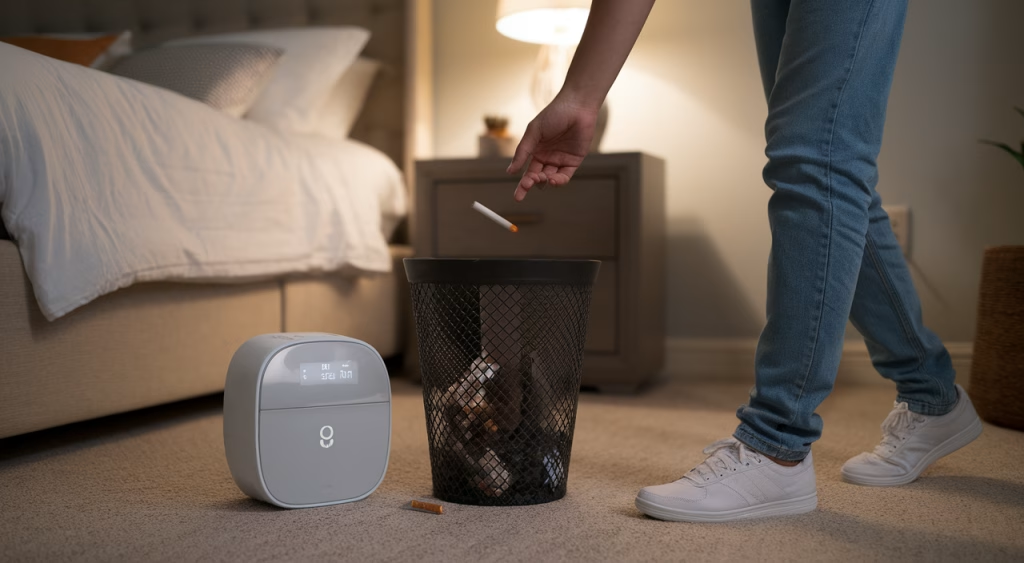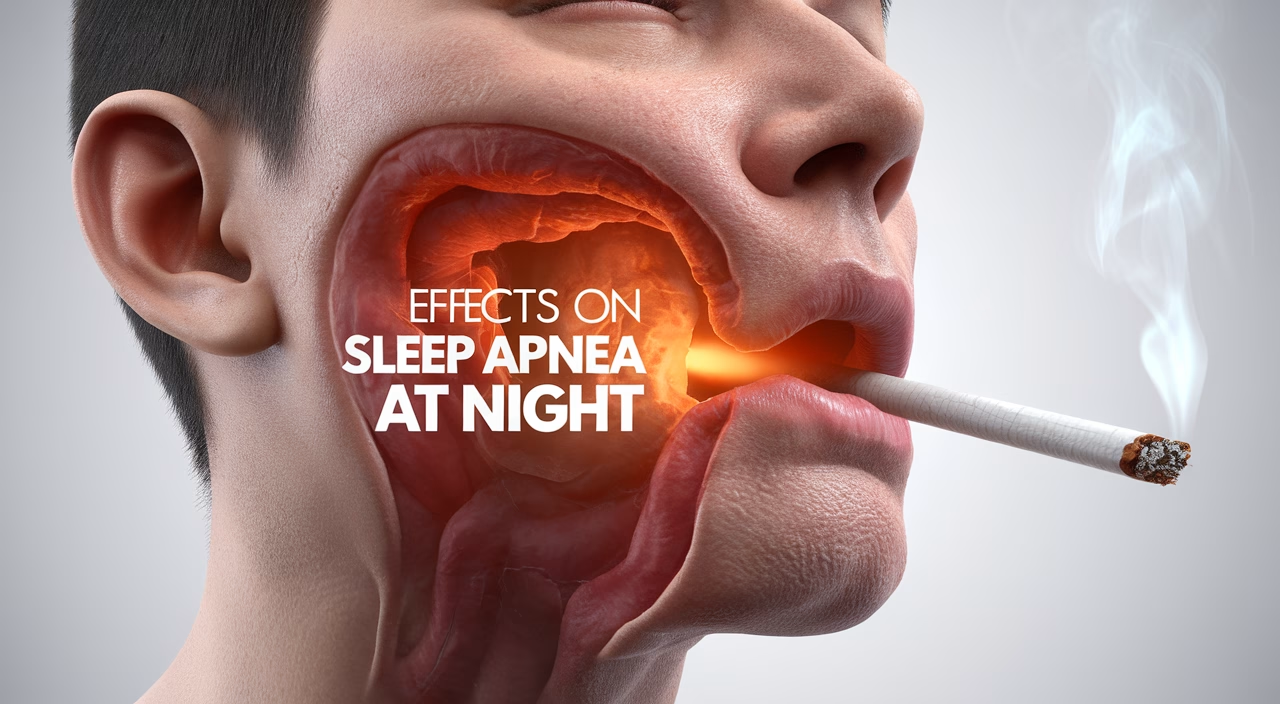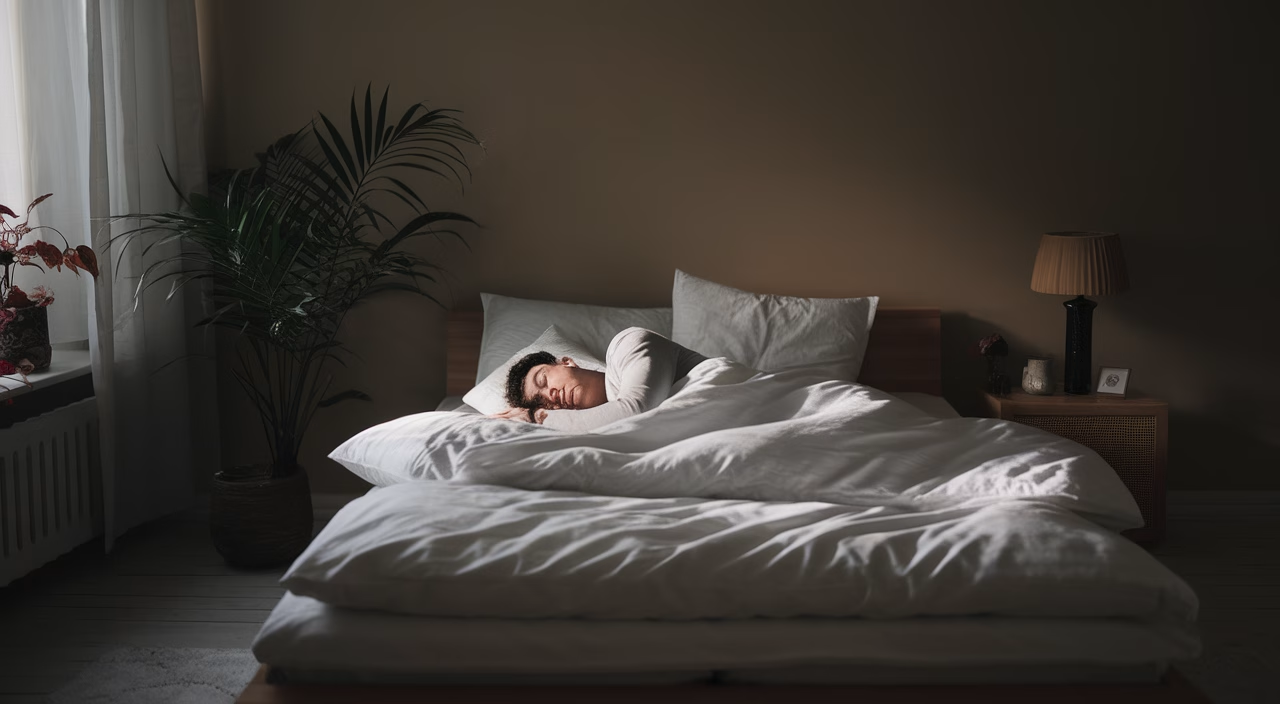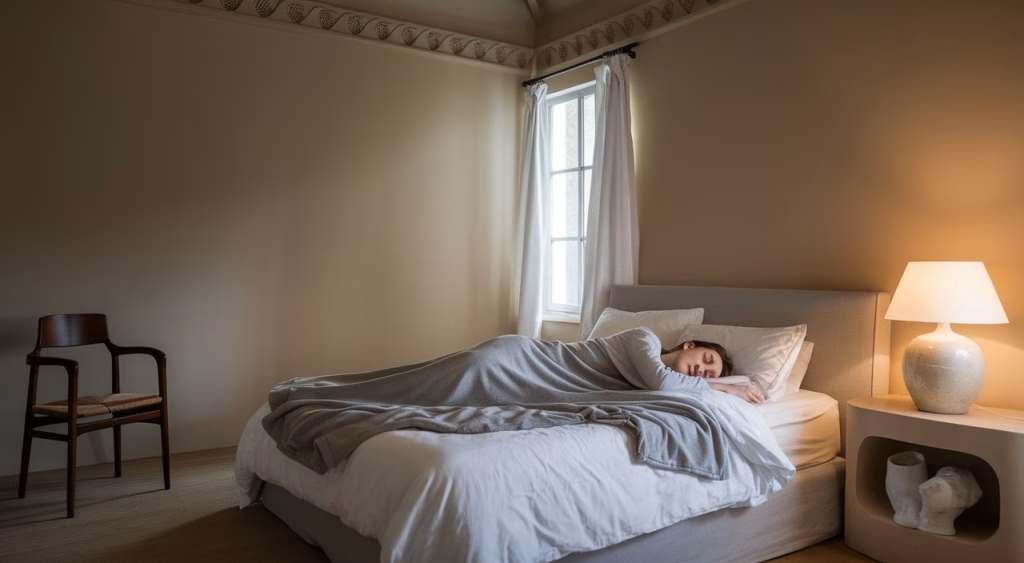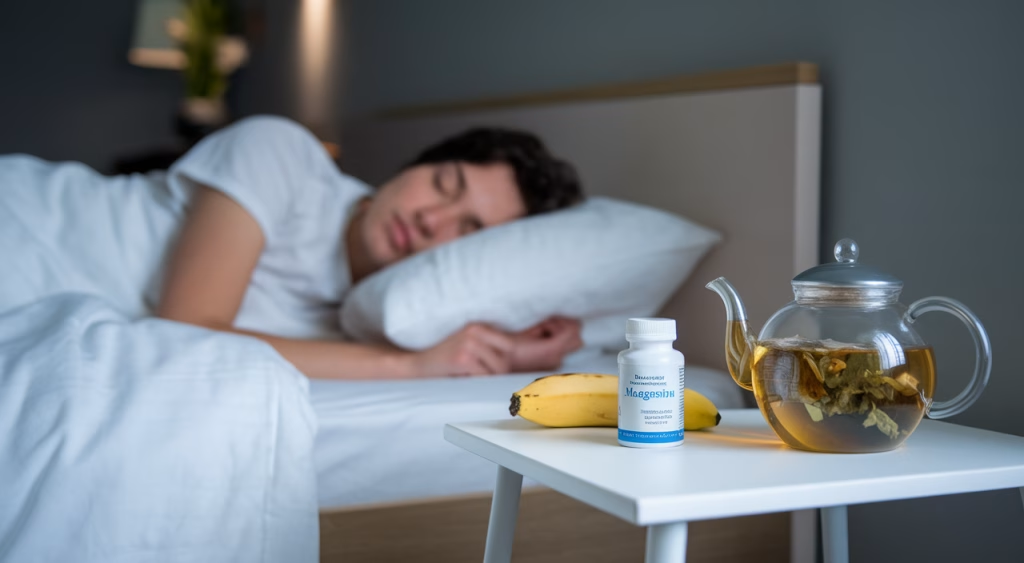What is the Connection Between Smoking and Sleep Apnea Recovery?
Here’s the harsh reality: smoking and sleep apnea create a devastating feedback loop that sabotages your health. Smoking dramatically worsens sleep apnea symptoms by inflaming your airways, while untreated sleep apnea makes quitting smoking nearly impossible due to chronic fatigue and stress. If you’re struggling with both conditions, you’re trapped in a cycle where each problem fuels the other, leaving you exhausted and desperate for relief.
TL;DR — Summary
- Smoking multiplies sleep apnea severity: Nicotine inflames airways, triggers excess mucus production, and narrows breathing passages, intensifying snoring and dangerous apneic episodes.
- Quitting smoking transforms sleep quality: Most people experience dramatically improved airflow, 40-60% fewer apneas, and deeper restorative sleep within weeks of quitting.
- Nicotine withdrawal temporarily disrupts sleep: Initial symptoms like insomnia and restlessness are common but fade quickly with proper management strategies.
- Quitting smoking accelerates long-term recovery: Your oxygen levels normalize, cardiovascular strain decreases, and CPAP therapy becomes significantly more effective.
- Proven strategies help you quit successfully: We’ll share evidence-backed methods that reduce cravings while optimizing your sleep environment for healing.
Understanding the Relationship Between Smoking and Sleep Apnea
Let’s examine the science: Sleep apnea occurs when your airway repeatedly collapses during sleep, cutting off oxygen flow to your brain and vital organs. Now add smoking to this equation — a habit that inflames and narrows the exact airways you need clear for breathing. The result? A perfect storm that turns your bedroom into a nightly battleground.
Every cigarette you smoke floods your respiratory system with over 7,000 toxic chemicals that trigger chronic inflammation throughout your throat, nasal passages, and upper airways. This swelling dramatically narrows your breathing pathways, especially when you lie down and gravity works against you. The inflammation doesn’t just disappear when you sleep — it intensifies, creating the ideal conditions for airway collapse.
Research reveals that smokers face three times higher risk of developing obstructive sleep apnea compared to non-smokers. But here’s what’s even more alarming: nicotine acts as a stimulant that disrupts the delicate muscle control in your upper airway, causing irregular contractions and spasms precisely during REM sleep — when your sleep apnea symptoms peak.
Effects of Smoking on Sleep Apnea Symptoms
Have you ever jolted awake gasping for air, your heart racing and sheets soaked in sweat? These terrifying episodes become more frequent and severe when smoking toxins compromise your already vulnerable airways. Here’s exactly how smoking amplifies your sleep apnea symptoms:
- Excessive mucus production: Smoking triggers your respiratory system to produce up to three times more mucus, creating sticky blockages in your throat and sinuses that worsen overnight.
- Severe nasal tissue swelling: Chronic inflammation reduces nasal airflow by up to 50%, forcing mouth breathing that dramatically increases snoring intensity and airway collapse risk.
- Disrupted muscle coordination: Nicotine interferes with the precise muscle timing needed to keep your airway open, increasing collapse frequency during critical sleep stages.
- Compromised oxygen processing: Smokers typically have 10-15% lower baseline oxygen saturation, making each apnea episode more dangerous for your heart and brain function.
The combined impact extends far beyond physical symptoms. Smokers with sleep apnea report severe daytime fatigue, cognitive fog, depression, and irritability — symptoms that are significantly worse than non-smokers with similar breathing issues. This happens because smoking compounds the sleep fragmentation caused by apnea, preventing your brain from achieving the deep, restorative sleep cycles essential for mental clarity and emotional stability.
Benefits of Quitting Smoking for Sleep Apnea Recovery
Here’s the encouraging truth: your body begins healing the moment you quit smoking, and the improvements in your sleep apnea can be remarkable. Within just 72 hours, your airways start reducing inflammation. Within two weeks, circulation improves and oxygen delivery becomes more efficient. Within a month, many people experience dramatically better sleep quality.
Let’s explore the specific benefits you can expect for your sleep apnea recovery:
- Dramatically improved airway function: Reduced inflammation and mucus production create clearer breathing passages, allowing smoother airflow throughout the night.
- Significantly lower apnea severity: Clinical studies show that apnea-hypopnea indexes (AHIs) can improve by 40-60% in patients who successfully quit smoking.
- Enhanced CPAP therapy effectiveness: Quitting smoking makes CPAP treatment more comfortable and efficient since your airways are less restricted and irritated.
- Restored natural sleep architecture: Once nicotine withdrawal subsides, your REM and deep sleep cycles normalize, providing the restorative rest your body desperately needs.
The transformation can be life-changing. Many people who quit smoking while managing sleep apnea report breathing easier, snoring less, waking up refreshed, and feeling energized throughout the day. Some individuals even see their sleep apnea severity drop from moderate to mild, potentially reducing their dependence on treatment devices.
Cost Guide: Quitting Smoking vs. Treating Sleep Apnea Alone
| Item or Service | Low-End Estimate | Mid-Range | High-End |
|---|---|---|---|
| NRT (Patches, Gum, Lozenges) | $30/month | $50/month | $80/month |
| Sleep Apnea Testing | $150 | $300 | $800 |
| CPAP Machine | $250 | $500 | $1200 |
| In-Person Smoking Cessation Program | $100 | $250 | $600 |
| Ongoing Medical Supervision | $50/month | $150/month | $300/month |
Tips for Overcoming Smoking Addiction to Improve Sleep
Quitting smoking while managing sleep apnea presents unique challenges, but we’ve developed proven strategies that work. Success requires more than willpower — you need a comprehensive approach that addresses nicotine withdrawal while optimizing your sleep environment for healing.
- Manage withdrawal symptoms strategically: Nicotine replacement therapy combined with behavioral support can reduce cravings by up to 70% while minimizing sleep disruption during the critical first weeks.
- Create an optimal sleep sanctuary: Use blackout curtains, maintain cool temperatures, eliminate electronic devices, and establish consistent bedtimes to maximize your body’s natural healing processes.
- Time your quit strategically: Choose a period with minimal stress and plan for 2-3 weeks where you can focus entirely on recovery without major obligations.
- Incorporate daily movement: Even moderate exercise improves mood, reduces stress hormones, and helps your body naturally prepare for deeper sleep.
- Build a strong support network: Whether through online communities, support groups, or professional counseling, having people who understand your struggle increases your success rate by over 300%.
Remember: while some people experience temporary sleep disruption during nicotine withdrawal, this typically resolves within 1-2 weeks. The short-term discomfort is nothing compared to the long-term benefits of breathing freely and sleeping deeply again.
Conclusion
The combination of smoking and sleep apnea creates a dangerous cycle that steals your energy, health, and quality of life. But here’s the empowering truth: breaking free from this cycle can transform both conditions simultaneously. Quitting smoking doesn’t just improve your lung health — it directly enhances your sleep architecture, reduces apnea events, and restores the deep, restorative rest your body craves.
If you’re currently battling both smoking and sleep apnea, you’re facing a challenging but absolutely winnable fight. Your body possesses incredible healing power that’s just waiting to be unleashed. Every smoke-free hour, every peaceful night’s sleep, and every deep breath of clean air moves you closer to the vibrant, well-rested life you deserve. The path to better sleep starts with your very next choice — and we believe you have the strength to make it.
Frequently Asked Questions
- How long after quitting smoking does snoring improve?
Snoring typically begins improving within 1-2 weeks after quitting smoking, as airway inflammation decreases and mucus production normalizes. Most people notice significant improvement within a month. - Can quitting smoking reduce sleep apnea symptoms?
Absolutely. Many individuals experience 40-60% fewer apnea episodes and significantly better oxygen saturation after quitting, especially when their sleep apnea was worsened by smoking-related inflammation. - Will I sleep worse after quitting smoking?
You may experience temporary sleep disruption during the first 1-2 weeks due to nicotine withdrawal. However, sleep quality typically improves dramatically once withdrawal symptoms subside. - Do nicotine patches affect sleep apnea?
Yes, nicotine patches can interfere with REM sleep and potentially worsen sleep apnea symptoms. Consider using patches only during daytime hours or explore non-nicotine cessation options with your doctor. - Is vaping safer for sleep apnea?
No. While vaping contains fewer toxins than cigarettes, nicotine still causes airway inflammation and muscle dysfunction that can worsen sleep apnea symptoms. - Does quitting smoking eliminate the need for CPAP?
In some mild to moderate cases, quitting smoking can reduce sleep apnea severity enough to minimize or eliminate CPAP dependence. However, always consult your sleep specialist before making any changes to your treatment plan.

